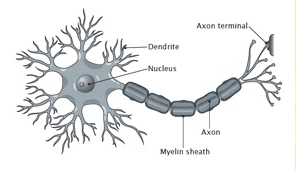07 Apr The Brain in a Bucket
Have you ever seen a real brain?
I remember the first time I saw one, in a neuropsych class: the instructor put on rubber gloves to protect against the formaldehyde preservative, popped the lid off of a lab bucket, and then pulled out a brain.
It didn’t look like much, a nondescript waxy yellowish-white blob rather like a sculpted head of cauliflower. But the whole class went silent. We were looking at the real deal, ground zero for consciousness, headquarters for “me.” The person it came from – or, in a remarkable sense, the person who came from it – was of course dead. Would my brain, too, end up in a lab bucket? That thought gave me a creepy weird feeling completely unlike the feeling of having my heart or hand in a bucket some day – which gets right at the specialness of your brain.
That blobby organ – just three pounds of tofu-like tissue – is considered by scientists to be the most complex object currently known in the universe. It holds 100 billion neurons (see the schematic illustration just below) amidst another trillion support cells. A typical neuron makes about 5000 connections called synapses with other neurons, producing a neural network with 500 trillion nodes in it. At any moment, each node is active or not, creating a kind of 0 or 1 bit of information. Neurons commonly fire five to fifty times a second, so while you’ve been reading this paragraph, literally quadrillions of bits of information have circulated inside your head.

Your nervous system – with its control center in the brain – moves information around like your heart moves blood around. Broadly defined, all that information is the mind, most of which is forever unconscious. Apart from the influence of hypothetical transcendental factors – call them God, Spirit, the Ground, or by no name at all – the mind is what the nervous system does. So if you care at all about your mind – including your emotions, sense of self, pleasures and pains, memories, dreams, reflections – (and who doesn’t?) then it makes tons of sense to care about what’s going on inside your own brain.
Until very recently, the brain was like the weather: you could care about it all you wanted, but you couldn’t do a thing about it. But new brain imaging technologies like functional MRI’s have revolutionized neuropsychology much as the invention of the microscope transformed biology. According to Dr. Alan Lesher, CEO of the American Association for the Advancement of Science, our knowledge of the brain has doubled in the past twenty years.
These breakthroughs have informed – and been informed by – practical applications in psychotherapy. For example, trauma therapies have been improved by research on memory, while the results of interventions such as EMDR have suggested new lines of investigation. Like other therapists, I feel clearer about a client’s mind because more is known about his or her brain.
I’m also a meditator – started in 1974, at the tail end of college – so it’s been inspiring to see something similar happening with contemplative practice. Some of the most interesting studies of brain function have been done on long-term meditators, the Olympic athletes of mental training. For example, experienced meditators actually have thicker cortical layers in the brain regions responsible for self-awareness and the control of attention.
This illustrates a fundamental point with extraordinary potential: when your mind changes, your brain changes, both temporarily – with the momentary flicker of synaptic activity – and in lasting ways through formation of new neural structures. Therefore, you can use your mind to change your brain to benefit your whole being – and every other being whose life you touch.
The new neuroscience, combined with the insights of clinical psychology and contemplative practice, gives you an historically unprecedented opportunity to shift your brain – and thus your mind – toward greater happiness, love, and wisdom.
And that’s what this blog is about: skillful means – from the intersection of psychology, neurology, and contemplative practice – for relieving distress and dysfunction, increasing well-being, and deepening mindfulness and inner peace.
We’ll focus on scientifically informed but eminently practical tools, skills, and perspectives – things you can use in the middle of daily life: on the job, in traffic, raising kids, when you’re nervous or mad, or working through a sticky conversation with your mom or your mate. For example, the next several entries in this blog will look at the power of gratitude to undo the threat reactivity of the brain, how to weave positive experiences into your brain and your self, and the three neural circuits of empathy.
With just a little understanding of your own brain, you can reach down inside the enchanted loom of your very being and gradually weave greater strength, insight, confidence, contentment, and loving intimacy into the tapestry of your life. That’s the great opportunity here: your brain is not in a bucket, it’s alive and pulsing with possibility, waiting for the skillful touch of your mind to guide it in increasingly wonderful directions.
I hope you’ll join me on this incredible journey.


